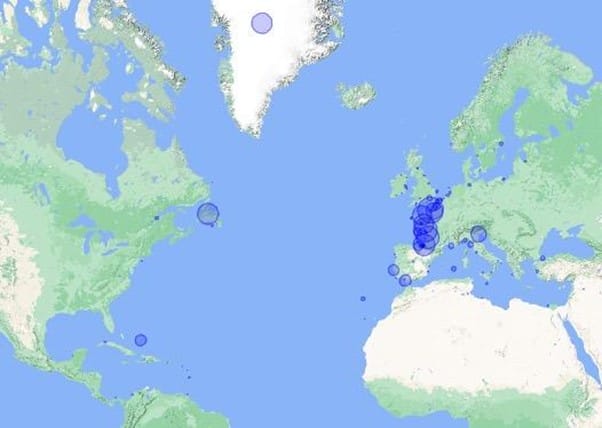The price of privilege: understanding absolutism and Atlantic commerce under the Sun King of France
This blog post by Lewis Wade (Leiden University) is based upon a grant awarded by the Economic History Society through its Research Fund for Graduate Students, as well as the author’s first book, ‘Privilege, Economy and State in Old Regime France: Marine Insurance, War and the Atlantic Empire under Louis XIV’. The Association of Business Historians’ annual conference was held at Northumbria University on 30 June-1 July 2023.
—
With the generous support of the Economic History Society, it was a pleasure to be able to present my doctoral thesis at the Association of Business Historians’ annual conference as part of the Coleman Prize session. This prize is awarded annually to a thesis in business history completed in a British university or with Britain as its subject. The timing was most fortuitous, as I was in the process of correcting the proofs for my book, Privilege, Economy and State in Old Regime France, which builds on my thesis. This was therefore a wonderful opportunity to take a step back and think about how best to present my findings to a broader audience, including modern historians of business.
At the heart of my book is marine insurance. The logic of this commercial instrument is straightforward: through an insurance policy, the risks of a given voyage are transferred to an insurer in exchange for an agreed sum (the premium). Although the origins of marine insurance can be traced to the Italian states, northern European markets were dominant in the early modern period. Amsterdam established itself as Europe’s leading insurance centre at the turn of the seventeenth century; in turn, London superseded Amsterdam in the eighteenth century, with Lloyd’s of London remaining the world’s leading insurance market to this day.
My book studies the largely forgotten interventions of Louis XIV’s ministers into the Parisian marine insurance market in the latter half of the seventeenth century and seeks to understand why the markets of Amsterdam and London thrived where that of Paris did not. I focus in particular on the two insurance institutions these ministers created. The first, the Royal Insurance Chamber, was established in 1668 under the auspices of Jean-Baptiste Colbert, the Sun King’s eminent minister. The Chamber was a space for underwriters, policyholders and commission agents to meet to negotiate policies. The map below shows the underwriting portfolio of Elisabeth Hélissant in 1672, who rose to become one of Paris’ leading insurers after her husband’s death in 1668. The voyages she underwrote that year touched 125 different named places in the western hemisphere, stretching from Veracruz in the west to Syria in the east, from Greenland in the north to Buenos Aires in the south. 1672 saw the outbreak of the Dutch War (1672–8); this was an especially challenging year for French shipping, and Hélissant was among many who subsequently withdrew from the Chamber entirely.

This crisis in the Chamber was heavily exacerbated by the flawed implementation of Colbert’s famous commercial ordinance (Ordonnance sur le commerce) in 1673. Just as cases were piling up in the courts of Paris, the ordinance created a crisis of jurisdiction over insurance disputes, leading to rampant confusion, delays, and irreparable damage to the Chamber’s reputation across Europe.
Unable to recover, the Chamber was eventually replaced by the Royal Insurance Company in 1686. This was established by Colbert’s son, the marquis de Seignelay, as the first chartered company in the history of marine insurance. Thirty influential financiers and merchants were brought on board as shareholders, with a handful selected to serve as directors, managing the Company’s global underwriting portfolio.
In studying this institution, I reflect more broadly on the core role(s) of corporations in society over time, which has been a hot topic of debate amongst business historians. Shareholders of the Company had access to a suite of social, legal and political privileges that promised to support their social ambitions; in exchange, they accepted that the state would leverage corporate funds to serve state interests. In short, I argue the Company was bound together by privilege, not by the prospect of profit, which makes this unlike any company we would expect to see today. The significant losses the Company sustained during the Nine Years’ War (1688–97) were not perceived as evidence of failure, but as a sign that it had served its purpose: insurance had become a substitute for the ailing French navy, which proved unable to protect domestic and neutral shipping.
This reflects, I argue, the broader system of risk management at the heart of the absolute monarchy, which leveraged its monopoly on privilege to shift the risks of its own policies onto its subjects, thus binding them to the monarchy and its interests. To secure or improve their own social standing and that of their successors, subjects across the social spectrum put their assets and their credit on the line in facilitating a given state objective on land or at sea.
The fate of the Parisian marine insurance market, then, owes a great deal to the shortcomings of the French state. While the British state was central to the success of Lloyd’s of London, neither the Chamber nor the Company received the support they needed to survive the impacts of Louis XIV’s ruinous wars.
In truth, as somebody who engages with business history from a slightly unconventional perspective, I was unsure how my presentation at the ABH conference would be received. In fact, the audience responded very warmly with excellent questions and comments. Being announced as this year’s Coleman Prize recipient was a true honour and gave me a most welcome boost as I took the final steps towards the publication of my book. I am most grateful to the ABH and look forward to attending its future conferences.
To contact the author:
Lewis Wade
@WadeHistory
Leiden University
References:
L. Wade, Privilege, Economy and State in Old Regime France: Marine Insurance, War and the Atlantic Empire under Louis XIV (Woodbridge: The Boydell Press, 2023).
L. Wade, ‘Underwriting Empire: Marine Insurance and Female Agency in the French Atlantic World’, Enterprise & Society FirstView (2022), pp. 1–29. https://doi.org/10.1017/eso.2022.33

